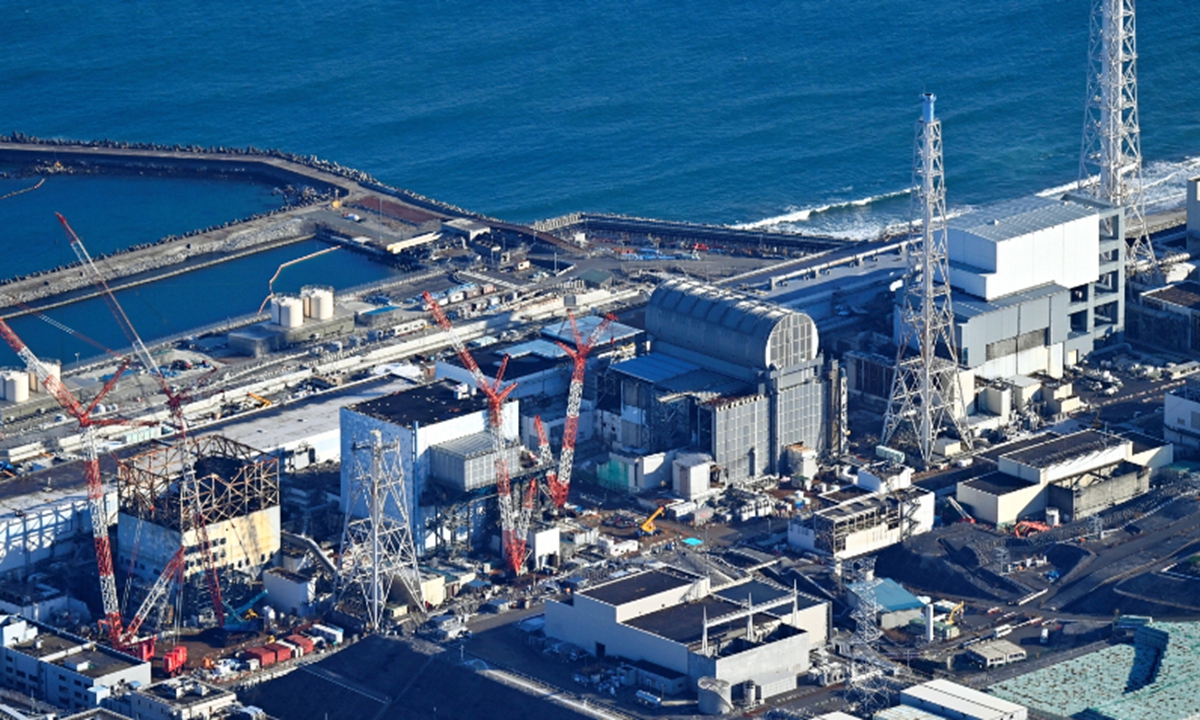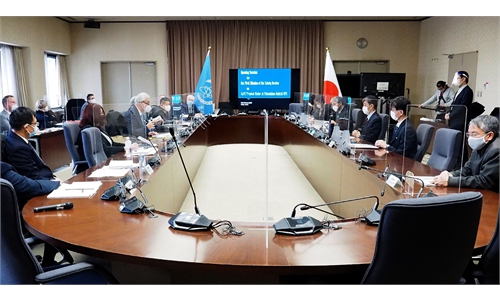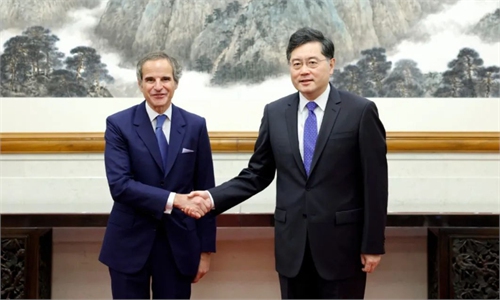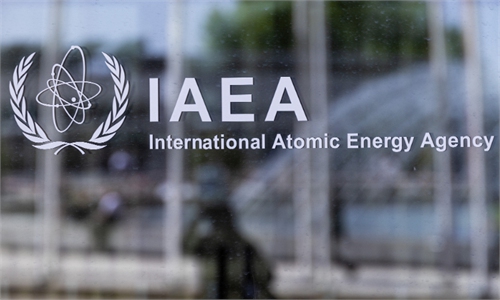
Aerial photo shows the damaged reactors at Fukushima Daiichi nuclear power plant on January 19, 2023, in Fukushima, Japan. Photo: VCG
The Fukushima nuclear-contaminated wastewater inspection team dispatched by the South Korean government will end its controversial trip and return home on May 26. Overall, this inspection basically confirmed the previous criticism from the domestic public opinion in South Korea, that this was a "three-no" inspection, with no direct sampling, no list of inspection team members being made public, and no media supervision. More importantly, the statement made by the head of the inspection team that this trip is to help South Korea "assess whether the treated water is safe enough to be discharged into the sea" has raised concerns that South Korea may "let Japan off the hook" on this issue.
This concern is not groundless. Since the agreement between the South Korean and Japanese leaders to dispatch an inspection team, the targets and scope of the investigation South Korea had preconceived had been repeatedly rejected by Japan during the entire negotiation process of the inspection team's itinerary. First, South Korea's expectation of "evaluating the safety of discharging nuclear-contaminated wastewater into the sea" and "jointly investigating the components and substances of nuclear-contaminated wastewater with Japan" were directly rejected by Japan, which stated that this trip was only to deepen South Korea's "understanding" of Japan's plan, and "Japan is not obligated to accept inspection requests from other countries." Then, Japan turned down South Korea's demand for the participation of civil experts in the inspection, citing that this was "a matter between governments," and even disallowed media participation, showing no respect for South Korea at all.
Without even taking actual samples, what is the South Korea "inspection team" inspecting? According to South Korean opposition figures, they are going to give Japan a "get-out-of-jail-free card," adding that participating in such an "inspection" is a disgrace for professionals. This is not just a simple formality. This "inspection" will be used by Tokyo to make a fuss. Japan may also use this to exert pressure and demand that South Korea open up imports of seafood from Fukushima and its nearby areas.
Recently, in order to reduce international resistance and moral costs of its plan, Japan has intensified its public relations efforts toward relevant countries and international organizations, and organized various "performances" to confuse the public. The "inspection team" from South Korea is a group of paid actors. If Japanese government's negligence is for the sake of saving time and money, then the ambiguity and vacillation shown by the South Korea government in the dumping of Fukushima's nuclear-contaminated wastewater reveals the terrifying aspect of "shameful diplomacy." Both are betrayals of their own citizens and irresponsibility toward public interests.
As a close neighbor, South Korea is no doubt one of the key stakeholders in the disposal of contaminated water from Fukushima. After Japan stubbornly chose the most irresponsible method of dumping contaminated water into the sea, South Korea's response was at the time the most intense. It immediately summoned the Japanese Ambassador in South Korea, lodged solemn protests against the decision, and even considered taking Japan to the international court. However, after the visit of the US Special Climate Envoy to South Korea at "a critical time," Seoul's attitude subtly changed. The administration of President Yoon Suk-yeol made a notable shift from the previous government's firm opposition. They even voluntarily explained Japan's risky actions.
In order to pursue the "easing" of relations between South Korea and Japan in line with Washington's intentions, the Yoon administration first made humiliating concessions on historical issues, and now they are giving Japan the green light on the issue of contaminated water. These two significant concessions by Seoul to Tokyo are like two knives stabbed in South Korea itself.
Under pressure from various parties, the Chief of Staff to the President of the Republic of Korea stated on May 24 that if the International Atomic Energy Agency (IAEA) approves the safety of Japan's nuclear-contaminated water, South Korea will accept the result and may not oppose the discharge. This is equivalent to South Korea abandoning its autonomy and initiative on this issue, displaying passivity. Currently, the IAEA technical working group has not completed the evaluation of Japan's discharge plan, and no final conclusion has been reached. However, it has pointed out several areas where Japan's discharge plan does not meet the agency's safety standards. But Japan forcefully approved the plan last July, completely disregarding the IAEA. They also attempted to influence and exploit the IAEA's review process, seeking a "pass" for Japan's dumpling plan and creating a false impression that the discharge is safe and harmless.
The dangers of dumping Fukushima's nuclear-contaminated water into the sea are evident. Instead of seriously responding to and addressing international concerns, Japan is trying to seize every opportunity to promote the discharge of contaminated water, including inviting South Korean inspection teams as a "shill." However, the disposal of Fukushima's nuclear-contaminated water is not solely Japan's private matter, and the Pacific Ocean is not Japan's sewer. Japanese and South Korean governments cannot afford the potential serious consequences. On this issue, both Tokyo and Seoul need to make decisions based on their conscience.



